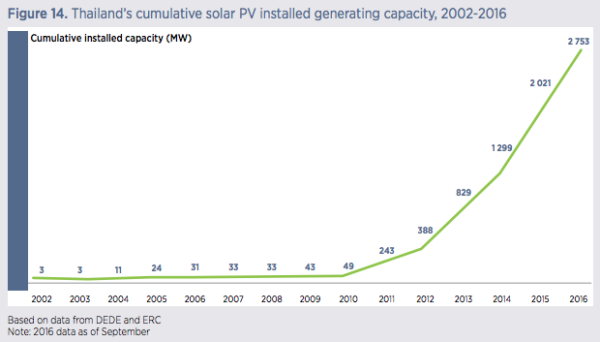With more than half of its energy demand covered by imported fuels, coupled with its rapidly depleting oil and gas reserves, Thailand’s energy security appears to lie in the hands of renewables.
According to a new report published by the International Renewable Energy Agency (IRENA) and the Ministry of Energy of Thailand, the share of renewables in the country's energy mix could reach 37%, surpassing its renewable energy (RE) target of 30% of total final energy consumption by 2036, as laid out in the Alternative Energy Development Plan (AEDP) 2015.
Increasing the share of RE would improve energy security and reduce the cost of Thailand’s energy system by $1.2 billion annually by 2036, finds the report, adding that an additional $8 billion per year could be saved in avoided externalities from environmental and health-related costs of fossil fuels.
“Thailand, like other Southeast Asian nations, stands at an important crossroads in its energy future, as its growing economy is set to fuel energy demand growth of close to 80% over the next two decades,” said IRENA Director-General Adnan Z. Amin. “The switch to renewable energy represents more than just an energy transition in Thailand – it can support a complete economic transformation.”
Solar recommendations
With solar installations already half way to reaching the 2036 solar PV target of 6 GW, the IRENA report suggests that there is room for increasing the target to almost 17 GW, considering Thailand’s abundant solar energy resource potential and solar’s rapidly falling costs.
The report also emphasizes the brisk pace of new solar PV installations over the past five years, during which Thailand’s total installed capacity increased tenfold.
Popular content

Largely untapped
In terms of rooftop solar PV, Thailand’s market remains largely untapped. As noted in the report, the country lacks a dedicated target for development, as well as incentives in the form of net-metering schemes.
In response to this void, just a month ago, the U.S. Agency for International Development (USAID) and the German development agency Deutsche Gesellschaft für Internationale Zusammenarbeit (GIZ) jointly issued a set of recommendations to facilitate rooftop PV deployment in Thailand.
The report further underlines the importance of developing a portfolio of different renewable energy sources in Thailand’s energy mix that can complement each other in resource availability across power generation, thermal uses and transportation.
Among other recommendations, it calls for increasing wind power share from 3 GW to 6 GW, scaling up solar thermal technologies, ensuring reliable supply of biomass fuels, and devising a long-term transportation development plan focusing on electric or renewable-based vehicles and fuel types.
This content is protected by copyright and may not be reused. If you want to cooperate with us and would like to reuse some of our content, please contact: editors@pv-magazine.com.



By submitting this form you agree to pv magazine using your data for the purposes of publishing your comment.
Your personal data will only be disclosed or otherwise transmitted to third parties for the purposes of spam filtering or if this is necessary for technical maintenance of the website. Any other transfer to third parties will not take place unless this is justified on the basis of applicable data protection regulations or if pv magazine is legally obliged to do so.
You may revoke this consent at any time with effect for the future, in which case your personal data will be deleted immediately. Otherwise, your data will be deleted if pv magazine has processed your request or the purpose of data storage is fulfilled.
Further information on data privacy can be found in our Data Protection Policy.